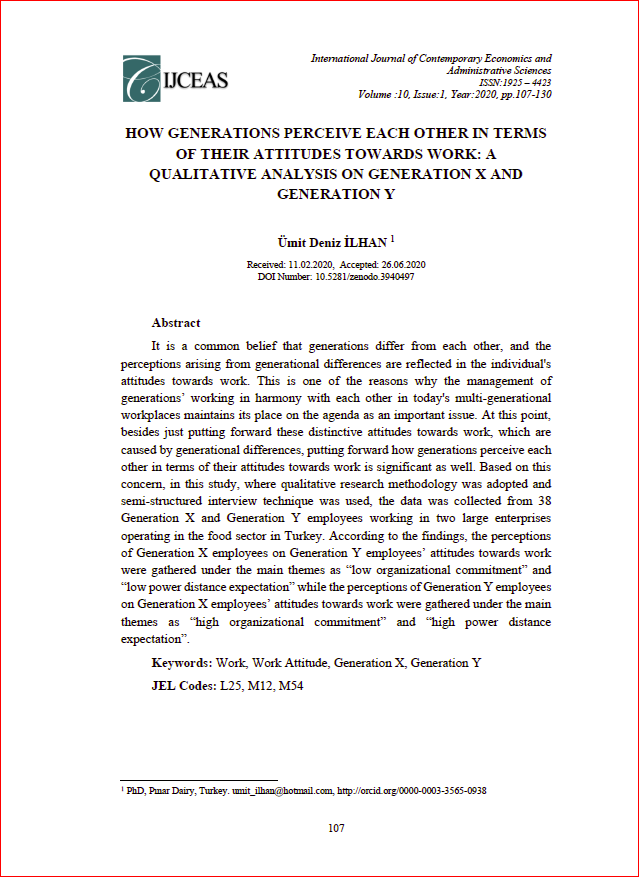How Generations Perceive each other in Terms of Their Attitudes Towards Work: A Qualitative Analysis on Generation X And Generation Y
DOI:
https://doi.org/10.5281/zenodo.3940497Abstract
It is a common belief that generations differ from each other, and the perceptions arising from generational differences are reflected in the individual's attitudes towards work. This is one of the reasons why the management of generations’ working in harmony with each other in today's multi-generational workplaces maintains its place on the agenda as an important issue. At this point, besides just putting forward these distinctive attitudes towards work, which are caused by generational differences, putting forward how generations perceive each other in terms of their attitudes towards work is significant as well. Based on this concern, in this study, where qualitative research methodology was adopted and semi-structured interview technique was used, the data was collected from 38 Generation X and Generation Y employees working in two large enterprises operating in the food sector in Turkey. According to the findings, the perceptions of Generation X employees on Generation Y employees’ attitudes towards work were gathered under the main themes as “low organizational commitment” and “low power distance expectation” while the perceptions of Generation Y employees on Generation X employees’ attitudes towards work were gathered under the main themes as “high organizational commitment” and “high power distance expectation”.

##submission.downloads##
Pubblicato
Come citare
Fascicolo
Sezione
Licenza
The Author(s) must make formal transfer of copyright for each article prior to publication in the International Journal of Contemporary Economics and Administrative Sciences. Such transfer enables the Journal to defend itself against plagiarism and other forms of copyright infringement. Your cooperation is appreciated. You agree that copyright of your article to be published in the International Journal of Contemporary Economics and Administrative Sciences is hereby transferred, throughout the World and for the full term and all extensions and renewals thereof, to International Journal of Contemporary Economics and Administrative Sciences.
The Author(s) reserve(s): (a) the trademark rights and patent rights, if any, and (b) the right to use all or part of the information contained in this article in future, non-commercial works of the Author's own, or, if the article is a "work-for-hire" and made within the scope of the Author's employment, the employer may use all or part of the information contained in this article for intra-company use, provided the usual acknowledgements are given regarding copyright notice and reference to the original publication.
The Author(s) warrant(s) that the article is Author's original work, and has not been published before. If excerpts from copyrighted works are included, the Author will obtain written permission from the copyright owners and shall credit the sources in the article. The author also warrants that the article contains no libelous or unlawful statements, and does not infringe on the rights of others. If the article was prepared jointly with other Author(s), the Author agrees to inform the co-Author(s) of the terms of the copyright transfer and to sign on their behalf; or in the case of a "work-for-hire" the employer or an authorized representative of the employer.
The journal is registered with the ISSN : 1925-4423.
IJCEAS is licensed under a Creative Commons Attribution 4.0 International License.
This license lets others distribute, remix, tweak, and build upon your work, even commercially, as long as they credit you for the original creation. This is the most accommodating of licenses offered. Recommended for maximum dissemination and use of licensed materials.

